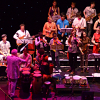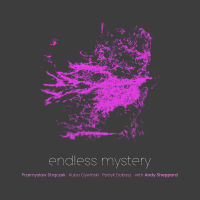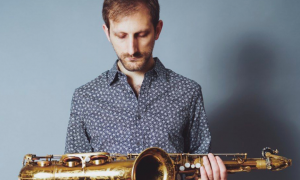Home » Jazz Articles » Interview » Joshua Redman: Music is Paramount
Joshua Redman: Music is Paramount
The business is secondary to the art, always. It always has been and always will be. I didn't get into the music business in order to make a living.
Yet if one insists on standard bearers, there are few out there as reliable and productive as Joshua Redman. Intelligent and affable, Redman isn't caught up in "who will carry on?" He's caught up in creating art. And he isn't caught up in the woes of a music industry (not just jazz) that has been taken over by bean counters in business suits, many of whom wouldn't know innovation, good music or art if it walked up to them and bit them in a place... well, where one would remember being bitten.
He's not only one of the most consistent and creative of his generation, he appears to be always open. Open to ideas and open to sharing them. He's aware of everything, yet relaxed. He's not unconcerned, but he's not anxious about his future, or that of the music. Recently at Skidmore College in Saratoga Springs, NY, Redman spent a week sharing his experiences with young music students, teaching master classes, lending a hand with ensembles, and capping it off with a concert. In both his relating to students, and his public concert — much of which was interesting original music — Redman displayed why the music is still in good hands. It's still going to roll on.
"Every year there's a great crop of jazz musicians who come to town and they're still musicians making records and touring. I actually believe that, artistically, the music is in great shape," Redman says. "It's a very exciting time in jazz. If anything, I think jazz is fresher and more creative and more open and more original than when I first came to town in the early 90s."
It's hard to be unaware of the way in which Redman burst on the scene at that time, giving up Harvard Law School for music, winning the prestigious Thelonious Monk International Jazz Saxophone Competition and plunging into New York City's jazz scene with the greats of the music scene. Successful CDs. Always something worthwhile to say on his horn. Redman has been a bit quieter this year, with no CD released (but expect a new Elastic Band recording early next year) and more sideman work than headlining. But he's been very active. Sitting still seems impossible.
"The business side of the music goes up and down. But as long as the music itself stays strong and creative and vital, things will work themselves out," he adds. "Even though there aren't necessarily the same kinds of opportunities for musicians today, the really dedicated, really talented musicians with something to offer will always find a way to make a living playing the music that they love to play."
Part of Redman's role at the college was to relate to the students and impart some of his experience. In that role, he also appeared laid back. And realistic.
"I certainly don't consider myself by any means a professional educator. I'm a student as well. I'm continually trying to learn more about music and develop as a musician. I don't come to these things with any real detailed plan. I don't have a lesson plan or a reading syllabus. I really try to approach these situations with an open mind. My approach is to try to offer whatever I can in the way of whatever knowledge and experience I've acquired over the years. Try to help the students out in whatever way if the most effective and the most natural."
He says that talking to aspiring musicians about the music side of the business is something he doesn't dwell on. If someone loves music, they'll find a way to make it part of their professional lives. At worst, an important part of their personal lives.
"Even though I am deeply immersed in the music business — it's my profession. I'm a professional musician — I've never thought of myself primarily as a professional musician. The business is secondary to the art, always. It always has been and always will be. I didn't get into the music business in order to make a living. I studied other things in college. I was going to go to law school. I thought that was going to be my profession. The reason why I didn't wasn't because I thought I could make a better living in music. Far from it. It was because I had the opportunity to play incredible music with some of the most brilliant musicians alive. Some of my heroes and idols. I couldn't turn down those opportunities."
"For me music is not a vocation, its an avocation," he adds. "It's a passion. That's one thing I would always try to stress to anybody getting into music. I don't believe you should go into music if your motivations are purely professional, or primarily professional. That doesn't mean you can't make a living playing music. You certainly can. But I think, paradoxically, if you really want to be successful playing music, you have to be doing music, not for the sake of success, but for the love of it. I think I'm one of the lucky few who has been able to be quite successful as a professional jazz musician. I've always made sure that my musical choices are always based on musical criteria and artistic needs.
"Everything that I do is based on what is going to inspire me as a musician. What's going to allow me to be the most creative, how am I going to best develop as a musician? Once I've made those determinations, then I can turn around and say: now how can I structure these goals in such a way that I'll also be able to make a living?"
Redman has been listening to jazz all his life, but was also hip to other sounds of the day. R&B like Earth Wind & Fire, Marvin Gaye and Aretha Franklin. Even the Beatles, which were before his time, but in his mother's record collection. Also in the collection was Ornette Coleman, John Coltrane, Miles Davis. Even his father, venerable saxophonist Dewey Redman, whom he did not grow up with. "Jazz was always on an equal footing with all the other musics. I listened to it as much as other musics. I didn't grow up with a sense of jazz as being marginal, as being something other, or something mysterious or esoteric. I grew up with a sense of jazz as being one of the great, inspiring exciting musics. Jazz has always been a part of my listening experience."
An outstanding high school musician, Redman still didn't apply himself fully to the instrument. He had other outside interests and intellectual pursuits. His interesting twist back into music is as natural to Redman as breathing. Life as a Harvard-graduated lawyer (Senator Redman? ... A real sax-playing president in the Whitehouse??) doesn't seem to cross his mind. His focus is squarely on his development as an artist and a person and the music that comes from his horn, and his pen, exemplifies that.
"First of all, I don't believe in regrets. Whatever choices you make in your life, whatever cards life deals you, you play that hand. You don't think about the cards you could have been dealt. You can't change the past. So I think regret is a very dangerous emotion," he says. "Even if I were to believe in regret, I certainly wouldn't regret the choice that I made. I was very, very fortunate, given a great opportunity to learn and grow as a musician and play with some of the best musicians around. Music gives me an emotional and spiritual fulfillment that no other profession could."
Redman said he wouldn't trade in the superb college education he received, but sometimes wishes he had more formal musical training. "I would have been, I think, a lot further ahead musically and a lot better prepared — just in terms of the basic fundamentals and knowledge — I would have been a lot more prepared for the challenges that I confronted musically early on, and that I continue to confront. I seem to have made it through somehow."
Redman "made it through" a fine acoustic trio set at the college with colleagues Reuben Rogers on bass and Ali Johnson on drums. A funky arrangement of "Mack the Knife" kicked things off. Sweetly arranged by the saxophonist, it had almost as many twists and turns as Monk's "Trinkle, Tinkle" which showed excellent communication among three stellar artists, and also brought out the joie de vivre in the music of Thelonious. Redman's own "Oneness of Two" and "Two Track Mind" held interest and intrigue. Each time the sax was expressive and exploring, at times traveling all kinds of paths, and eliciting a broad range of sounds, within the same number. Rogers' bass was right in step, and Jackson's steady — sometimes quirky — rhythmic additions were always apropos. Worthy of note was Redman's willingness to present some relatively new works to the audience. One had never been played in public before, and others sparingly played.
Titles? Well, they were all untitled, "that seems to be a theme," Redman said with a wide grin, but each was attractive, and one — which constantly changed time signatures — brought out all kinds of bombast, caution thrown to the wind and music made in the moment.
The concert is one of the few Redman has done as a headliner this year. He's toured as a sideman, and in the spring was involved as artistic director of the SFJazz spring season, an organization that founded the San Francisco Jazz Festival. Redman has directed SFJazz's spring performance series for five years, and this year a resident ensemble was created, "designed to be a kind of composer's collective, a workshop. We got eight musicians from around the country, each of whom was a composer and a leader in his or her own right, to come together for five weeks to jam and rehearse and work on new music for three weeks, then go on the road for another two weeks. This was our first year, so that took up much of my time in the spring, and I'll also do that next spring. I'm starting to gear up for that again."
Bobby Hutcherson, Miguel Zenon, Nicholas Payton, Josh Roseman, Renee Rosnes, Robert Hurst and Brian Blade are the other collective members.
As far as his own projects, Redman said he is still involved with the Elastic Band that began in 2002 and produced a well-regarded CD ( Elastic ). "It's a little bit more of a groove-based project than some of the things I've done before. It uses electric, as well as acoustic instruments." The group finished a new recording in February, but in the interim the label, Warner Brothers, was sold and eliminated its jazz department, said Redman.
"It wasn't clear where I was going to go and what was going to happen. Because of that, even though the record was done, it didn't get released. Now it looks like I'm going to remain on Warner Brothers. I'm going to be on a label called Nonesuch, which is a subsidiary. They're going to release the record, hopefully, in the spring of next year. Then I'll start touring again heavily with that band."
So Redman rolls with the punches and comes out fine. He says: "Certainly, it's important to have an awareness of the business of music. But the central thing has to be your passion for music and the love of music. And I think that's why most people would want to be musicians."
Visit Joshua Redman on the web at www.joshuaredman.com .
Tags
PREVIOUS / NEXT
Joshua Redman Concerts
Support All About Jazz
 All About Jazz has been a pillar of jazz since 1995, championing it as an art form and, more importantly, supporting the musicians who make it. Our enduring commitment has made "AAJ" one of the most culturally important websites of its kind, read by hundreds of thousands of fans, musicians and industry figures every month.
All About Jazz has been a pillar of jazz since 1995, championing it as an art form and, more importantly, supporting the musicians who make it. Our enduring commitment has made "AAJ" one of the most culturally important websites of its kind, read by hundreds of thousands of fans, musicians and industry figures every month.





















